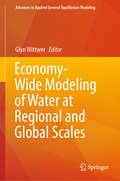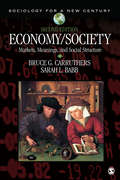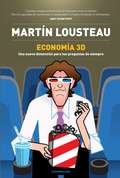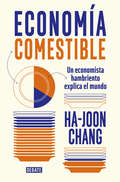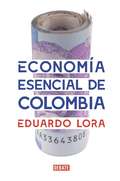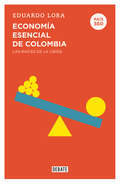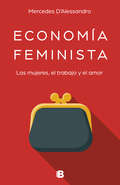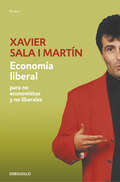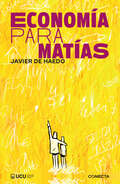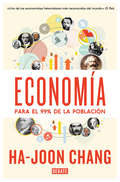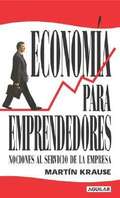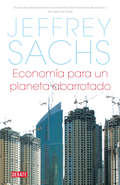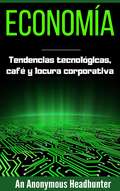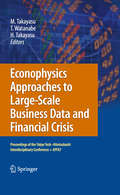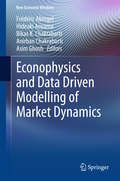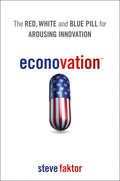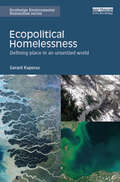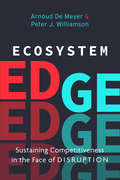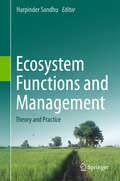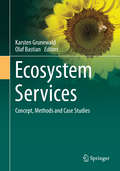- Table View
- List View
Economy-Wide Modeling of Water at Regional and Global Scales (Advances in Applied General Equilibrium Modeling)
by Glyn WittwerThis book deals with the economic modelling of water at the global, national and sub-national levels. It presents a multi-faceted analysis and, while it outlines the theories behind various models, its main purpose is to analyse policy issues and present insights arising from modelling, including a chapter analysing the macroeconomic implications of climate change. Arguably the most compelling reason for publishing a book on the economic modelling of water arises from the fact that agriculture accounts for approximately 70% of water used for economic purposes, while only contributing 4% of global income. Given that water is an essential commodity, this discrepancy may in part be symptomatic of an undervaluation of water due to immature and incomplete markets. In turn, this undervaluation has led to an ongoing misallocation of water. When economic models include water accounts that feed into production functions, they model impacts on the marginal product of water. Policies that improve the link between the marginal product and price of water will improve water allocation, while advanced economic models such as those presented here can enhance our ability to explore the possible impacts of improved policy.
Economy/Society: Markets, Meanings, and Social Structure
by Bruce G. Carruthers Sarah Louise BabbIn this long-awaited second edition of Economy/Society Markets, Meanings, and Social Structure, authors Carruthers and Babb continue to offer an accessible introduction to the way social arrangements affect economic activity, and shows that economic exchanges are deeply embedded in social relationships. Understanding how society shapes the economy helps us answer many important questions. For example, how does advertising get people to buy things? How do people use their social connections to get jobs? How did large bureaucratic organizations come to be so pervasive in modern economies—and what difference does it make? How can we explain the persistence of economic inequalities between men and women and across racial groups? Why do some countries become rich while others stay poor? This book presents sociological answers to questions like these, and encourages its readers to view the economy through a sociological lens.
Economía 3D: Una nueva dimensión para tus preguntas de siempre
by Martín Lousteau«Lousteau no es un técnico. Martín respira economía las 24 horas. Tienela capacidad de transformar lo inexplicable en simple. Lo tedioso enentretenido. No lo admiro por haber sido el ministro más joven de lahistoria sino por la pasión y la honestidad con que encara su trabajo».Andy Kusnetzoff, conductor de Perros de la calle ¿La economía te resulta aburrida, ajena, difícil y sin alma? Nodesesperes. También puede hacerte reír, aprender y hasta darte un pocode esperanza. Para eso no hace falta ponerse solemnes: alcanza conredescubrir con nuevos ojos sus enseñanzas más valiosas. En estaspáginas, Martín Lousteau se mueve como un guía experto entre los tópicosmás diversos e inesperados. El rol de los bancos y del sistemafinanciero, los esquemas mentales inconscientes que orientan nuestrasdecisiones, el desarrollo, la relación entre el dinero y la felicidad,la economía del sexo y del deporte, el consumo desorientado, ladesigualdad, la crisis argentina y la debacle mundial, la ecología y elcambio climático son algunas de las estaciones de este recorrido repletode realidad, humor y conocimiento.
Economía comestible: Un economista hambriento explica el mundo
by Ha-Joon ChangUn festín de ideas económicas alternativas de la mano del autor de 23 cosas que no te cuentan sobre el capitalismo. «El único libroque he leído que me ha hecho reír, salivar y reevaluar mis ideas sobre economía, todo al mismo tiempo. Un volumen divertido, profundo y apetitoso».Brian Eno Cuando, en los años ochenta, el economista Ha-Joon Chang aterrizó por primera vez en Reino Unido desde Corea del Sur, se encontró con un país que comenzaba a salir de la insípida dieta inglesa y a experimentar con los sabores del resto del mundo. Eraun trayecto inverso al que estaba recorriendo la economía, cada vez más acomodada en una única escuela. Su nuevo y esperado libro, Economía comestible, demuestra con ejemplos claros y sabrosos que del mismo modo que esesencial abrirse a las diversas tradiciones culinarias también lo es disponer de una amplia variedad de perspectivas económicas. En este fascinante y delicioso volumen, Chang convierte en apetecibles todo tipo de ideas económicas, explicándolas a través de algunos ingredientes y recetas de diferentes lugares del planeta. Así, el chocolate puede ser una dulce adicción, pero aporta emocionantes ideas sobre las economías posindustriales del conocimiento; y mientras que la okra hace que el gumbo del sur de Estados Unidos tengauna suavidad que derrite el corazón, también remite a la enmarañada relación entre el capitalismo y la libertad. Desde el coste oculto del trabajo del hogar hasta el lenguaje engañoso del libre mercado, mientras cocina platos de todo el mundo, como el sándwich favorito de Elvis, las gambas al ajillo españolas y el dotorimuk coreano, este irresistible divulgador sirve un festín de ideas audaces fácil de digerir y con el que cambiar el mundo. La crítica ha dicho:«Excelente. Chang lleva dos décadas esforzándose por ofrecer una alternativa al neoliberalismo. Ahora ha alcanzado la cima de su propósito».Dan Davies, The Guardian «Un fascinante estofado de comida, historia y economía».Tim Spector «Una brillanteréplica al mito de que los legisladores pueden sobrevivir en simple programa neoliberal. Economía comestible es un festín portátil de ideas económicas alternativas envueltas en ingeniosas historias sobre comida de alrededor del mundo. Ha-Joon Chang demuestra una vez más que es uno de los economistas en activo más apasionantes».Owen Jones «Ha-Joon Chang lo ha vuelto a hacer. Su prosa deleita y nutre a partes iguales. De algún modo, consigue introducir un urgente debate sobre la relevancia de la economía en nuestro día a día a través de historias sobre comida y cocina que son encantadoras, divertidas y dulces (pero nunca agrias). Enfrentándose a los poderes económicos, Chang parece un osito de peluche asaltando a un rottweiler».David Pilling «En esta divertida guía, Ha-Joon Chang combina datos culinarios y conocimientos económicos. Impregna el estudio de curiosidades relacionadas con la comida, cubre un impresionante abanico de temas económicos y concluye con un llamamiento a los lectores para que escudriñen, piensen con imaginación y tengan una mentalidad abierta en su búsqueda de conocimientos económicos».Publishers Weekly
Economía esencial de Colombia
by Eduardo LoraEl libro que te ayudará a comprender el funcionamiento de la economía en Colombia de una forma didáctica y sencilla. ¿Sabe quién tiene el poder económico y cómo dispone de él? ¿Le gustaría entender por qué hay tanta desigualdad en Colombia? ¿Le han hablado de las implicaciones económicas y sociales del machismo? ¿Conseguirá usted una pensión? ¿Cree que está pagando demasiados impuestos? Economía esencial de Colombia le ayudará a responder muchas preguntas como estas, con un lenguaje directo y cifras sencillas; es un libro de economía que reúne lo esencial, lo que todos deberíamos saber, escrito sin términos técnicos ni matemáticas y que permite a cualquier lector construir su propia interpretación del pasado, el presente y el futuro del país. Eduardo Lora es uno de los economistas más notables de su generación. Ha dedicado su vida al estudio de los fenómenos económicos y sociales en entidades como Fedesarrollo, el Banco Interamericano de Desarrollo (BID) y la Universidad de Harvard. Este es su primer libro de divulgación.
Economía esencial de Colombia (País 360)
by Eduardo LoraLa economía colombiana no es materia exclusiva de especialistas o iniciados. De forma clara y elocuente, este libro explica los asuntos que más nos afectan: salarios, pensiones, salud, educación, impuestos, medioambiente, tasas de interés, inflación, mercado laboral (con un revelador enfoque de género), crecimiento, desplazados, inmigración, y lo hace a la luz de los efectos de la pandemia y de la crisis social. Temas familiares en mayor o menor medida para todos, pues son parte de la vida diaria, que es donde se encuentran tanto las raíces del descontento como los nuevos futuros para los jóvenes. En la actualización que presentamos, Eduardo Lora hace una contribución única a la divulgación del conocimiento sobre la realidad colombiana y al debate nacional sobre las políticas públicas que necesita el país.
Economía feminista: Economía y feminismo unidos para revolucionar ideas y estereotipos del presente
by Mercedes D'AlessandroEconomía feminista propone, basándose en evidencias estadísticas, una mirada que cuestiona la economía como ciencia y plantea nuevas dimensiones a las viejas disputas sobre desigualdad y pobreza, al tiempo que aporta ideas para construir una sociedad más igualitaria y justa. Economía feminista presenta una mirada que sacude todo el esqueleto conceptual de la economía como ciencia y plantea nuevas dimensiones a las viejas discusiones sobre desigualdad o pobreza. D´Alessandro profundiza sobre la brecha salarial, el trabajo no remunerado, el papel de la maternidad en las posibilidades profesionales de la mujer, la feminización de la pobreza y el techo de cristal al que nos enfrentamos las mujeres en la política y el mundo laboral. «Las mujeres, la mitad de la población mundial, hoy son minoría en todos los ámbitos en los que se toman decisiones de peso. Disputar estos lugares implica transformar el modo enel que hemos pensado el rol de la mujer en toda la historia pasada. Es un cambio muy profundo... que ya comenzó y que es irreversible. La economía feminista es revolucionaria o no es, porque no se puede conseguir igualdad en un mundo de opresión, porque no hay igualdad en un mundo de pobreza, porque no hay igualdad en un mundo de explotación.»Mercedes D'Alessandro
Economía liberal para no economistas y no liberales
by Xavier Sala i MartínConvencido de las bondades de la economía liberal de mercado, Sala i Martín expone su pensamiento con el carácter divulgativo que caracteriza sus colaboraciones en los medios de comunicación. Un libro serio y a la vez entretenido y asequible. Un libro de economía para no economistas. Xavier Sala i Martín es catedrático de Economía de la Universidad de Columbia (Nueva York) y profesor visitante de la Universitat Pompeu Fabra (Barcelona). Siendo una de las máximas autoridades mundiales en cuestiones de desarrollo y crecimiento económico. Su obra Economic Growth es el libro de texto sobre el tema más utilizado en el mundo. Entre los investigadores económicos nacidos en el Estado español, su nombre ha sido el más citado en las revistas especializadas internacionales durante la última década. «Es sencillo, a veces muy divertido, y aclara, sin perder rigor, algunos puntos cruciales de la discusión entre antiglobalizadores y liberales.»
Economía liberal para no economistas y no liberales
by Xavier Sala i MartínUn libro de economía para no economistas. Un libro riguroso y a la vez entretenido y asequible. Convencido de las bondades de la economía liberal de mercado, Sala i Martín expone su pensamiento con el carácter divulgativo que caracteriza sus colaboraciones en los medios de comunicación. Xavier Sala i Martín, catedrático de economía por la Universidad de Columbia, es una de las máximas autoridades a nivel mundial en cuestiones de desarrollo y crecimiento económico. Su obra Economic Growth es el libro de texto sobre el tema más utilizado en el mundo. Entre los investigadores de este campo nacidos en el estado español, su nombre ha sido el más citado en las revistas especializadas internacionales durante la última década. Reseña:«Es sencillo, a veces muy divertido, y aclara, sin perder rigor, algunos puntos cruciales de la discusión entre antiglobalizadores y liberales.»Revista de Libros
Economía para Matías
by Javier De HaedoEconomía para Matías es un libro escrito con la pasión de quien convirtió a la Economía en el centro de su actividad profesional desde hace ya algunas décadas. Pero es, sobre todo, un instrumento de construcción de ciudadanía. En Economía para Matías el prestigioso economista Javier de Haedo asume un desafío mayor: tratar de explicarle a los jóvenes uruguayos algunos conceptos esenciales para entender el funcionamiento de las relaciones económicas en la sociedad. Lo hace en un lenguaje llano, directo, y tan claro, que el libro se convierte página tras página en una herramienta para entender cómo la Economía influye en nuestra vida cotidiana. Pero va más allá. Matías es el hijo menor del autor. Este es el libro que como padre le escribe para hablarle de aquello que le apasiona y, a la vez, explicarle cómo se toman las decisiones en un país, su país. De Haedo hace transitar así al lector, de la economía al funcionamiento del sistema político, de las decisiones económicas que adoptan gobiernos, parlamentos, y entidades públicas, al efecto que esas decisiones tienen en la vida de cada ciudadano. Explica el entramado de relaciones entre las diferentes áreas del Estado y los agentes económicos de una forma tan didáctica y fácil de entender, que su libro será seguramente apreciado por muchos padres y docentes preocupados por lograr que los más jóvenes entiendan cómo “funciona” realmente el Uruguay.
Economía para el 99% de la población
by Ha-Joon ChangManual para entender la economía de forma crítica ¿Qué es la economía? ¿Por qué importa? ¿Qué puede -y qué no puede- explicar acerca del mundo? La economía es demasiado importante para dejarla en manos de los economistas. Por eso, en esta irreverente introducción, Ha Joon Chang presenta las distintas teorías económicas con las fortalezas y las debilidades de cada una, y explica porqué no hay una sola manera de explicar el comportamiento de la economía. Tras su exitoso 23 cosas que no te cuentan sobre el capitalismo, el prestigioso economista de Cambridge desmonta los tópicos existentes y expone la diversidad de fuerzas que juegan un papel en la economía. Así nos otorga las herramientas necesarias para entender un mundo cada vez más global e interconectado que a menudo obedece los dictados económicos. Desde el futuro del euro, la desigualdad en China o el estado de la industria americana, Economía, manual de usuario es una guía concisa y amena a los fundamentos económicos que ofrece un retrato claro y completo de la economía global y de cómo influye en nuestra vida cotidiana.
Economía para emprendedores
by Martín KrauseLos emprendedores, grandes y pequeños, constituyen el motor de la economía: desarrollan nuevos productos y mercados, conciben estrategias e invierten capital, creatividad y esfuerzo en sus proyectos. A pesar de esta relevancia, muchas veces las teorías económicas parecen darles la espalda, al no considerar los temas que les interesan. ¿Cómo definir la misión y la estrategia de una empresa? ¿Qué dimensión y qué tipo de organización resultan más adecuados a la realidad del mercado? ¿Cómo se generan el conocimiento y las innovaciones para aprovechar oportunidades? Este libro propone una reconciliación entre la teoría y los principales actores de la economía. Muestra de manera accesible que la ciencia económica tiene mucho para ofrecer al emprendedor, tanto en lo que hace a la comprensión de su propia función como a la forma en la que le conviene organizar su empresa, asignar tareas y responsabilidades, motivar a sus colaboradores y desarrollar una cultura basada en valores que destaquen la iniciativa y la responsabilidad individual.
Economía para un planeta abarrotado
by Jeffrey SachsNuestras ideas sobre los mercados, el poder y la soberanía nacional todavía no han aceptado las realidades de un planeta abarrotado. ¿Cómo incrementar la prosperidad económica en el mundo? ¿Cómo reducir las disparidades entre ricos y pobres y la insoportable presión sobre el medio ambiente? ¿Cómo afrontar el vertiginoso crecimiento de la población mundial y los agudos conflictos políticos y culturales que nos rodean?En este libro Jeffrey Sachs, «probablemente el economista más importante del mundo» (The New York Times), presenta una visión de cómo el pensamiento y la acción económica deben ser reformulados para responder a la realidad global, y cómo los líderes políticos, las personas y las organizaciones tienen que admitir que las reglas del juego económico han cambiado y empezar a actuar con las realidades globales del siglo en la cabeza.
Economía: Tendencias Tecnológicas, Café y Locura Corporativa
by An Anonymous HeadhunterEconomía por un Cazatalentos Anónimo Tendencias Tecnológicas, Café y Locura Corporativa Este es un libro escrito sobre tendencias de negocio y también sirve como una advertencia sobre el futuro, escrito por un cazatalentos que desea permanecer en el anonimato. Advertencia: Este libro fue escrito para adultos y contiene contenido para adultos como el uso de drogas, y por lo tanto no es apropiado para menores de 18 años de edad. Este es un libro escrito sobre tendencias de negocio y también sirve como una advertencia sobre el futuro, escrito por un cazatalentos que desea permanecer en el anonimato.
Econophysics Approaches to Large-Scale Business Data and Financial Crisis: Proceedings of Tokyo Tech-Hitotsubashi Interdisciplinary Conference + APFA7
by Tsutomu Watanabe Hideki Takayasu Misako TakayasuThe new science of econophysics has arisen out of the information age. As large-scale economic data are being increasingly generated by industries and enterprises worldwide, researchers from fields such as physics, mathematics, and information sciences are becoming involved. The vast number of transactions taking place, both in the financial markets and in the retail sector, is usually studied by economists and management and now by econophysicists. Using cutting-edge tools of computational analysis while searching for regularities and "laws" such as those found in the natural sciences, econophysicists have come up with intriguing results. The ultimate aim is to establish fundamental data collection and analysis techniques that embrace the expertise of a variety of academic disciplines. This book comprises selected papers from the international conference on novel analytical approaches to economic data held in Tokyo in March 2009. The papers include detailed reports on the market behavior during the financial crisis of 2008 and discussions on the mechanism of bubbles and crashes, with proposals for avoiding new crises. Filled with up-to-date research, this book will interest researchers and students, finance professionals, and scholars in diverse fields.
Econophysics and Companies: Statistical Life and Death in Complex Business Networks
by Hideaki Aoyama Yoshi Fujiwara Yuichi Ikeda Hiroshi Iyetomi Wataru SoumaEconophysics is an emerging interdisciplinary field that takes advantage of the concepts and methods of statistical physics to analyse economic phenomena. This book expands the explanatory scope of econophysics to the real economy by using methods from statistical physics to analyse the success and failure of companies. Using large data sets of companies and income-earners in Japan and Europe, a distinguished team of researchers show how these methods allow us to analyse companies, from huge corporations to small firms, as heterogeneous agents interacting at multiple layers of complex networks. They then show how successful this approach is in explaining a wide range of recent findings relating to the dynamics of companies. With mathematics kept to a minimum, the book is not only a lively introduction to the field of econophysics but also provides fresh insights into company behaviour.
Econophysics and Data Driven Modelling of Market Dynamics
by Bikas K. Chakrabarti Anirban Chakraborti Hideaki Aoyama Frédéric Abergel Asim GhoshThis book presents the works and research findings of physicists, economists, mathematicians, statisticians, and financial engineers who have undertaken data-driven modelling of market dynamics and other empirical studies in the field of Econophysics. During recent decades, the financial market landscape has changed dramatically with the deregulation of markets and the growing complexity of products. The ever-increasing speed and decreasing costs of computational power and networks have led to the emergence of huge databases. The availability of these data should permit the development of models that are better founded empirically, and econophysicists have accordingly been advocating that one should rely primarily on the empirical observations in order to construct models and validate them. The recent turmoil in financial markets and the 2008 crash appear to offer a strong rationale for new models and approaches. The Econophysics community accordingly has an important future role to play in market modelling. The Econophys-Kolkata VIII conference proceedings are devoted to the presentation of many such modelling efforts and address recent developments. A number of leading researchers from across the globe report on their recent work, comment on the latest issues, and review the contemporary literature.
Econophysics of Agent-based models
by Bikas K. Chakrabarti Anirban Chakraborti Hideaki Aoyama Frédéric Abergel Asim GhoshThe primary goal of this book is to present the research findings and conclusions of physicists, economists, mathematicians and financial engineers working in the field of "Econophysics" who have undertaken agent-based modelling, comparison with empirical studies and related investigations. Most standard economic models assume the existence of the representative agent, who is "perfectly rational" and applies the utility maximization principle when taking action. One reason for this is the desire to keep models mathematically tractable: no tools are available to economists for solving non-linear models of heterogeneous adaptive agents without explicit optimization. In contrast, multi-agent models, which originated from statistical physics considerations, allow us to go beyond the prototype theories of traditional economics involving the representative agent. This book is based on the Econophys-Kolkata VII Workshop, at which many such modelling efforts were presented. In the book, leading researchers in their fields report on their latest work, consider recent developments and review the contemporary literature.
Econophysics of Income and Wealth Distributions
by Bikas K. Chakrabarti Anirban Chakraborti Satya R. Chakravarty Arnab ChatterjeeThe distribution of wealth and income is never uniform, and philosophers and economists have tried for years to understand the reasons and formulate remedies for such inequalities. This book introduces the elegant and intriguing kinetic exchange models that physicists have developed to tackle these issues. This is the first monograph in econophysics focussed on the analyses and modelling of these distributions, and is ideal for physicists and economists. It is written in simple, lucid language, with plenty of illustrations and in-depth analyses, making it suitable for researchers new to this field as well as specialized readers. It explores the origin of economic inequality and examines the scientific steps that can be taken to reduce this inequality in the future.
Econovation: The Red, White, and Blue Pill for Arousing Innovation
by Steve FaktorOver the last 20 years, China fed our zombie-like appetite for iPhones, Prada and Snuggies. At the same time, its biggest customer, the US, found itself in debt, under-educated, and covered with recreational tattoos. So now what? Will America wallow in mediocrity like Greece or some C-list celebrity? Or, will our legendary ingenuity save us from Tweeting...and eating our way to irrelevance? Econovation is a bold, witty response to those questions that doesn't rely on miracles or government for answers. It challenges business leaders to think differently about the next decade of the US economy and respond with big, sustainable innovations. Written by Steve Faktor, former Vice President of Growth & Innovation and head of the Chairman's Innovation Fund at American Express, Econovation is a trends book on steroids. It's bursting with practical, thought-provoking ideas no executive, entrepreneur or Fed Chairman can afford to miss. Most importantly, Econovation envisions a very different future. It's one ruled by "producerism", not consumerism. It's a future in which real innovators must do more than slide a greasy finger over the screen of an iPad. Econovation uncovers opportunities in unexpected places. You'll learn how to: Capitalize on a market that will go from making nothing to making everything...for China. Use psychological pricing and some crafty tricks from Google to reduce reliance on tapped-out consumers Sell to consumers whose new identities will be based on what they create, not what they buy, click or super-size Seduce a desperate government to finance your business, then feed you pancakes in the morning Motivate tomorrow's employee with social currency instead of the green, depreciating kind Upgrade your business and your kids with a little help from Mormons and kindergartners with hacksaws Econovation is a fresh perspective on a future we've taken for granted. It empowers readers to think big, dream big, and conquer economic conditions that will paralyze others. With a hefty dose of data, humor, and actionable ideas, Econovation offers insight and amusement in one, convenient place - a rare treat for a business book.
Ecopolitical Homelessness: Defining place in an unsettled world (Routledge Environmental Humanities)
by Gerard KuperusWhile our world is characterized by mobility, global interactions, and increasing knowledge, we are facing serious challenges regarding the knowledge of the places around us. We understand and navigate our surroundings by relying on advanced technologies. Yet, a truly knowledgeable relationship to the places where we live and visit is lacking. This book proposes that we are utterly lost and that the loss of a sense of place has contributed to different crises, such as the environmental crisis, the immigration crisis, and poverty. With a rising number of environmental, political, and economic displacements the topic of place becomes more and more relevant and philosophy has to take up this topic in more serious ways than it has done so far. To counteract this problem, the book provides suggestions for how to think differently, both about ourselves, our relationship to other people, and to the places around us. It ends with a suggestion of how to understand ourselves in an eco-political community, one of humans and other living beings as well as inanimate objects. This book will be of great interest to researchers and students of environmental ethics and philosophy as well as those interested in the environmental humanities more generally.
Ecosystem Edge: Sustaining Competitiveness in the Face of Disruption
by Peter J. Williamson Arnoud De MeyerTo succeed in the face of disruptive competition, companies will need to harness the power of a wide range of partners who can bring different skills, experience, capacity, and their own networks to the task. With the advent of new technologies, rapidly changing customer needs, and emerging competitors, companies across more and more industries are seeing their time-honored ways of making money under threat. In this book, Arnoud De Meyer and Peter J. Williamson explain how business can meet these challenges by building a large and dynamic ecosystem of partners that reinforce, strengthen, and encourage innovation in the face of ongoing disruption. While traditional companies know how to assemble and manage supply chains, leading the development of a vibrant ecosystem requires a different set of capabilities. Ecosystem Edge illustrates how executives need to leave notions of command and control behind in favor of strategies that will attract partners, stimulate learning, and promote the overall health of the network. To understand the practical steps executives can take to achieve this, the authors focus on eight core examples that cross industries and continents: Alibaba Group, Amazon.com, ARM, athenahealth, Dassault Systèmes S.E., The Guardian, Rolls-Royce, and Thomson Reuters. By following the principles outlined in this book, leaders can learn how to unlock rapid innovation, tap into new and original sources of value, and practice organizational flexibility. As a result, companies can gain the ecosystem edge, a key advantage in responding to the challenges of disruption that business sees all around it today.
Ecosystem Functions and Management
by Harpinder SandhuThis is the first book to provide vital information on key local ecosystems, their functions, state of health, and their role in development in an Asian context, particularly on the Indian subcontinent. It addresses six major ecosystems on the Indian subcontinent - mountain, rural, desert, forest, urban, and freshwater - and discusses their functions, how they support livelihoods and the economy, the impacts on ecosystem services, and management issues. Asia is home to nearly one third of the global population. With massive industrialization occurring at an increasing pace to support the lifestyles of a growing population, impacts on natural ecosystems are inevitable in this region. The book also explores the concepts, theory and practice regarding these key ecosystems by linking them with the livelihoods of a large population base and subsequently illustrating their importance for sustainable development in the region. Further, by suggesting policies and ways in which these systems can be maintained and enhanced, it facilitates better management of natural resources within the ecological constraints to achieve socio-economic objectives and move towards a green economy for sustainable and equitable development in the region.
Ecosystem Services
by Pieter J. H. van Beukering Jetske A. BoumaDespite the growing popularity of the concept of ecosystem services, policy makers and practitioners continue to struggle with the challenge of translating it into practice. Drawing on a range of interdisciplinary perspectives, this volume takes up the challenge to provide a framework for the effective implementation of simple concepts into complex ecosystem-related decision-making. Addressing the measurement, valuation and governance of ecosystem services, the book is specifically designed to guide students and policy-makers from definitions and measurements to applications in terms of policy instruments and governance arrangements. Each chapter discusses key methodological approaches, illustrating their applications at various scales by drawing on case studies from around the world. Presenting a range of perspectives from across many fields, this text ultimately considers the crucial question of how ecosystem service delivery can be safeguarded for generations to come.
Ecosystem Services - Concept, Methods and Case Studies
by Karsten Grunewald Olaf BastianNature provides us with many services seemingly for free: recharged groundwater, fertile soil and plant biomass created by photosynthesis. We human beings draw extensive benefits from these "ecosystem services," or ES - food, water supply, recreation and protection from natural hazards. Major international studies, such as the Millennium Ecosystem Assessment, have addressed the enormous role of biodiversity and ecosystems to human well-being, and they draw particular attention to the consequences resulting from the reduction or loss of these services. These very topical issues are being addressed by authors/scientists in a wide variety of disciplines - and their approaches, terminologies and methodological specifics are just as diverse. What, for example, does the efficacy of nature or natural capital mean? Which values of nature are particularly important, how are they distributed in space and time and how can they be assessed and the relevant knowledge promoted? Can all ecosystem services be quantified and even monetarised? What should be done to ensure that the multiple services of nature will be available also in future? This book explains the multifaceted concept of ecosystem services, provides a methodological framework for its analysis and assessment, and discusses case examples, particularly from Germany. It is addressed to scientists and practitioners in the administrative, volunteer and professional spheres, especially those who deal with environment, landscape management and nature conservation and regional and land-use planning. The target group includes experts from the business community, politicians and decision makers, students and all those interested in fundamental ecological, economic, ethical and environmental issues.
